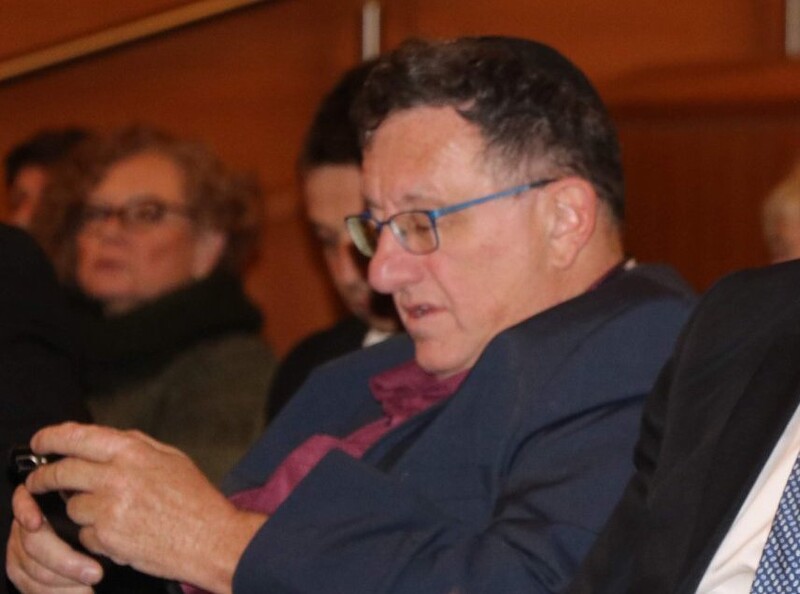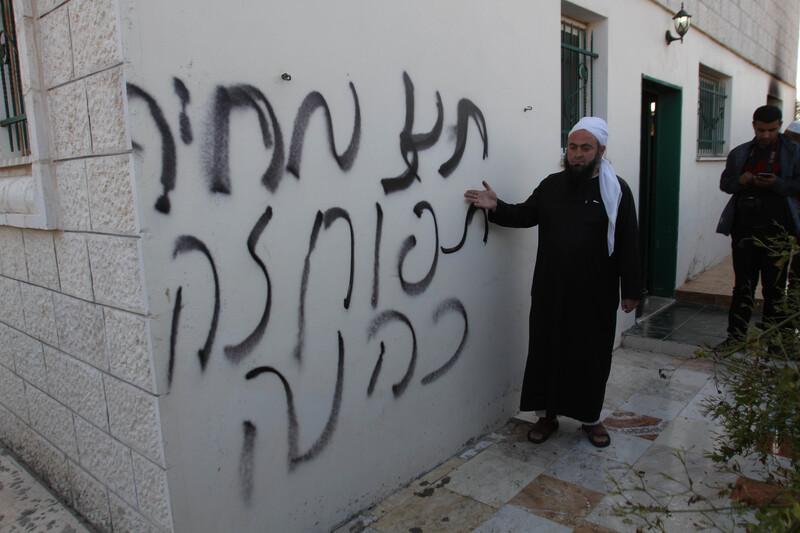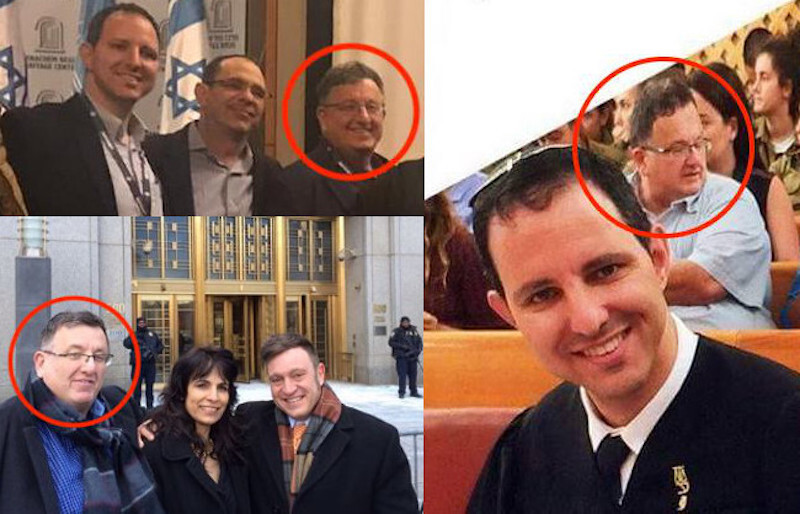Power Suits 23 December 2020

Aviel Leitner (formerly known as Craig Arthur Leitner) at a Shurat HaDin conference in February.
FacebookThe co-founder of a “lawfare” group with close ties to Israeli intelligence led a terror cell that carried out attacks on Palestinian civilians in the 1980s.
Shurat HaDin lawyer and co-founder Aviel “Avi” Leitner was convicted of a series of violent attacks on Palestinians, Middle East Eye revealed this month.
Shurat HaDin claims to be a “civil rights” organization fighting terrorism in foreign courts, and that it is independent from the Israeli government.
But a US diplomatic cable exposed by Wikileaks in 2011 showed the group to be a front for the Mossad and other Israeli spy agencies.
The legal office of the Israeli government’s National Security Council “saw the use of civil courts as a way to do things that they are not authorized to do,” the cable quoted its president saying.
The group has now essentially admitted to being a Mossad front, in a 2017 book by its president Nitsana Darshan-Leitner.
Married to Aviel Leitner, Darshan-Leitner is the group’s other co-founder.
Shurat HaDin lawyers use “lawfare” to attack Palestinians and Palestine solidarity groups in courts around the world.
Darshan-Leitner was scheduled to take part in a conference this month which smeared Palestinian human rights groups as being run by “terror leaders.”
Upon calling their Tel Aviv office, Shurat HaDin told The Electronic Intifada that Leitner was “not available.”
Asked about Leitner’s membership of the Kach terrorist organization, the staffer answering the phone said they couldn’t “confirm or not-confirm anything,” but offered to pass on a message.
An email with questions for Leitner has so far not been answered.
Violent campaign
Born as Craig Arthur Leitner, he fled at age 23 to his home city of New York in 1984 to escape from testifying against a co-conspirator. But he was extradited to Israel in 1986 and sentenced to 30 months in jail, serving only a year.
Leitner and his cell were members of Rabbi Meir Kahane’s Jewish Defense League, as well as Kach, Kahane’s political party in Israel.
The program of both groups demanded the expulsion of all Palestinians from the “Land of Israel” – Palestine between the river and the sea. Kach was listed as a terror group by the US State Department.
Kach was outlawed, and in 1990 Kahane was assassinated. But he is still venerated by the most extreme Israeli settlers in the West Bank today, who use the popular slogan “Kahane was right.”

Graffiti left by Israeli settlers after a 2014 firebomb attack on a Palestinian mosque claims it as a “price tag” in the name of Meir Kahane. The Jewish extremist rabbi died in 1990.
APA imagesLeitner has confessed to violent attacks against Palestinian civilians.
In the early hours of 4 March 1984, members of Leitner’s cell loaded an M16 assault rifle and opened fire on a bus of Palestinian workers. They were traveling between Ramallah and Jerusalem, in the occupied West Bank.
Leitner drove the getaway car and planned the attack.
To prepare, he had written to the JDL’s boss in New York instructing him that when he received a collect call from “Mr. Gray” it would be the signal to phone the Israeli media and claim responsibility for the attack on behalf of a Kach front group.
“Violence is a tool,” Leitner’s co-conspirator Matt Liebowitz later told US journalist Robert I. Friedman. “For me and for others there was a certain mystical attachment to blood and violence … Kahane taught us that what we were doing was true and correct according to the Torah.”
According to Friedman’s 1990 book on Kahane The False Prophet, the extremist rabbi told a press conference that the shooting was “sanctified by God.”
Nine Palestinian workers were injured. The attack was the culmination of a campaign of terror that had lasted almost a year.
In one of the attacks, in Jerusalem in August 1983, Leitner threw Molotov cocktails through the window of the office of Al Fajr (a Palestinian newspaper) as well as through the windows of Palestinian homes.
In a signed confession to Israeli authorities, Leitner explained how his cell chose their targets: any Palestinian would do. “We made Molotov cocktails and drove to an Arab neighborhood. We threw two Molotovs at one of the Arab houses chosen at random.”
Radicalized in New York
The cell had first been trained at a camp in the Catskill Mountains, New York state, between 1981 and 1983. “The camp produced 50 good, dedicated JDL people who would prowl the streets of New York at night in search of Arab or Russian victims,” Liebowitz told the journalist.
During that period, the JDL was implicated in a number of attacks on US soil. These included the bombings of Soviet and Arab diplomatic missions in New York and the firebombing of an Arab-owned restaurant in Brooklyn, in which a woman was killed.
“That summer there were 12 to 15 bombings,” Liebowitz recalled. “We had an underground bomb lab in a house in Borough Park crammed with explosives, Tommy guns, Uzis… We knew a grand jury was investigating us and that federal indictments were coming down.”
A group of around 40 suspects, including Liebowitz, fled to Israel in 1983.
After escaping Israeli custody (in circumstances that remain unclear) and fleeing the country, Leitner was arrested in 1986 by US marshals at the White Plains, New York campus of Pace University Law School where he was studying at the time.
According to Friedman, after being freed from jail in Israel, Leitner returned to New York, and by 1990 was studying law again, at Touro College in Manhattan.
Friedman reported that Leitner’s father was a top official in the New York City Board of Education.
Low profile
Given his criminal record, Leitner is keeping a relatively low profile working for Shurat HaDin, while his wife has the spotlight.
Aside from a few press clippings, describing him only as Darshan-Leitner’s husband, Shurat HaDin’s website doesn’t seem to mention him at all. A LinkedIn profile in his name with no photo says only that he is a freelance “senior consultant.”
But he does speak on the organization’s behalf while talking to the Hebrew press.
In 2015, journalist Richard Silverstein noted a Hebrew newspaper article which reported that Leitner had been “an activist in the Kahanist movement 30 years ago.”

Aviel Leitner appears among his Shurat HaDin colleagues in their Facebook photos.
FacebookLeitner crops up in photos on the Facebook accounts of Shurat HaDin and its staff. One photo shows Leitner sitting near a Shurat HaDin lawyer in court, apparently closely following proceedings.
And in an interview with a Christian college radio station in May last year, Leitner was described as Shurat HaDin’s co-founder.
Host Jon Gauger of Moody Bible Institute in Chicago welcomed Leitner to his “Land and the Book” show as “one of the founders of the Shurat HaDin Israel law center.”
The US embassy cable published by WikiLeaks also says that Shurat HaDin was established “by Nitsana Darshan-Leitner and her American-born husband Avi Leitner, both attorneys.”
In the radio interview, Leitner says former Mossad chief Meir Dagan first came up with the idea for Shurat HaDin: “it was his idea that we should go out with our lawsuits and try to seize or obstruct the terror groups from moving money around.”
But despite Shurat HaDin’s claim to be acting against “terrorists,” most of its sabotage activity targets non-violent Palestinian and pro-Palestinian activism, legal action and even, in one case, Jimmy Carter’s 2006 book Palestine: Peace Not Apartheid.
Led by Israeli government
Leitner revealed in the radio interview that Shurat HaDin had been asked by the Israeli government to “study the problem” of the March of Return protests by Palestinian civilians in Gaza between March 2018 and December 2019.
Israeli forces killed more than 215 Palestinians during those protests. Almost 10,000 more were wounded by live ammunition. Some of the injured are permanently paralyzed or have had limbs amputated.
In the radio interview, despite admitting that many of these victims were children as young as 13, Leitner accused the demonstrators of “violently attacking, you know, the Israeli border” and said that “Israeli soldiers were, unfortunately, injuring or killing them.”
Leitner revealed that Shurat HaDin was “asked by the Israeli foreign ministry” to “study the problem” of the protests and how to “make the case to the international organizations.”
In the interview, Leitner also said they had helped Israel to stop humanitarian aid flotillas to the Gaza Strip – which has been besieged by Israel since 2007.
He said that “Shurat HaDin was asked to see if we could do something against these boats which claimed maybe they want to break the naval blockade.”
He explained that “we’ve worked with the Israeli navy to try to go on the offensive against these boats.”
In 2010, Israel boarded the Mavi Marmara, a ship carrying aid to Gaza aiming to break the blockade. Israeli soldiers killed 10 activists, one of whom was a US citizen. *
Correction: This article initially stated that the US diplomatic cable proving Shurat HaDin’s ties with Israeli intelligence was exposed by WikiLeaks in 2013. In fact, WikiLeaks published the cable in 2011 as part of a wider tranche of cables. Research by Spinwatch unearthed the cable in 2013, as we reported at the time.





